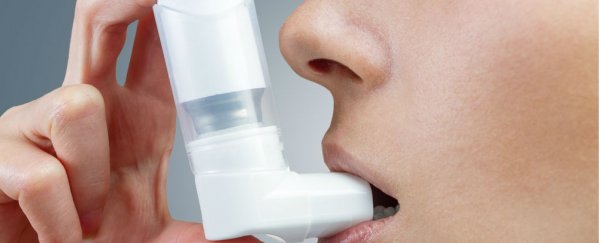An hallucinatory drug, sometimes sold as a substitute for LSD, has been shown to help prevent asthma in mice.
Researchers in the US have demonstrated that a very small dose of the psychedelic drug DOI - about 50 to 100 times less than what is needed to alter behaviour - can prevent the development of symptoms linked to asthma in mice. It raises the possibility that treatments for humans could be developed without any psychedelic side-effects.
DOI (2,5-dimethoxy-4-iodoamphetamine) was developed by an American chemist named Alexander Shulgin in the 1980s. (He actually synthesised a wide array of psychedelics over the latter half of the 20th century and carefully tested them on himself, but that's a different story for another day).
The substance is known to produce a psychedelic high somewhat comparable to LSD. But another form of the drug, known as R-DOI, is used by scientists to study the activity of neurotransmitters in the brain, such as serotonin.
This 'feel good' chemical sends signals between neurons, and helps regulate complex behaviours such as mood, cognition, appetite, sleep aggression, memory, and sex. But as Levi Gadye from io9 points out, serotonin is an interesting neurotransmitter in that it's not confined to activity in the brain or central nervous system. It can also exist in other parts of the human body, where it plays a role in regulating things like blood pressure, gut function, and inflammation.
Pharmacologist Charles Nichols and his team at Louisiana State University (LSU) have been investigating experimental therapies, particularly in relation to how hallucinogenic drugs such as LSD and R-DOI activate serotonin receptors and influence their functions.
The Nichols Lab at LSU has previously shown that activation of the serotonin receptor 5-HT2A with psychedelics produces anti-inflammatory activity in tissues of the blood vessels and gut. This led the team to explore the possibility of using psychedelics to treat asthma - a chronic lung condition characterised by inflammation of the airways.
By exposing mice to a chicken protein, first through injections, and two weeks later through an aerosol spray, the researchers induced an allergic-condition that serves as a model for human asthma. Thirty minutes before the aerosolised chicken protein was administered, some of the mice were given an inhaled dose of R-DOI.
Two days later, the team compared the respiratory functions of the mice and examined their lungs. Remarkably, they found that the R-DOI-treated mice were breathing normally, and that common symptoms of asthma, such as mucus production and airway inflammation, had been suppressed.
"These drugs are known only for their effects in the brain," said Nichols in a press release. "What we have demonstrated for the first time is that they are also effective in treating physiological diseases outside of the brain, a completely new and exciting role for this class of drug."
"Not only is this a significant breakthrough in the field of study of serotonin and psychiatric drugs, but it is a breakthrough in the field of asthma as well. We have identified an entirely new anti-inflammatory mechanism for the treatment of asthma in the clinic that could someday be administered in an inhaler or a daily pill."
Their results have been published in the American Journal of Physiology — Lung Cellular and Molecular Physiology.
Source: io9.com
